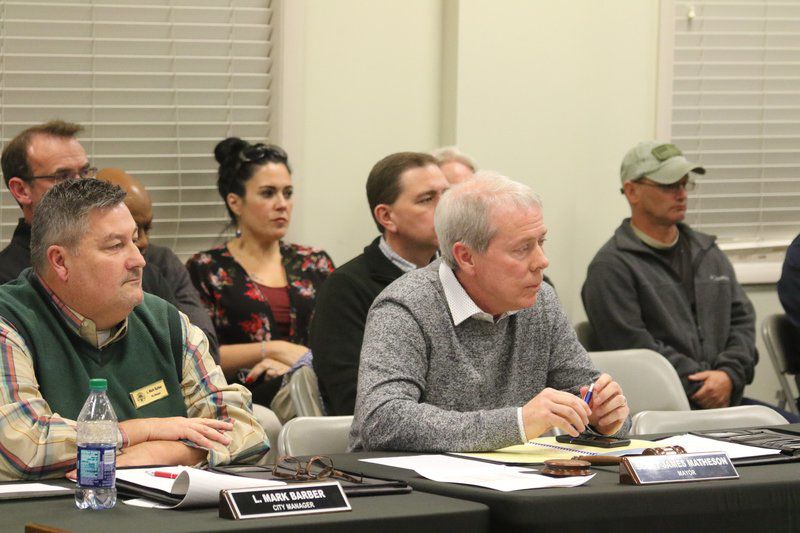Valdosta fined $122,000 for sewage spills
Published 5:30 pm Monday, May 4, 2020

- Chris Herbert | Valdosta Daily TimesValdosta City Manager Mark Barber and Mayor-elect Scott James Matheson answer frustrated residents in January over the 7.5 million gallon sewage spill in December.
VALDOSTA – The city of Valdosta has agreed to pay a $122,000 penalty for sewage spills that have occurred during the past two years.
A 7.5-million gallon sewage spill in December 2019 caused Georgia’s Environmental Protection Division to hand down a consent order, published on April 27, outlining 12 measures for the City of Valdosta to establish and follow, with the first decree requiring paying a $122,000 fine.
That December spill, caused when an outside contractor failed to reconnect a sensor in the treatment plant, was the largest in recent years in Valdosta and resulted in a tense January public forum between local and North Florida officials and residents.
The consent order is essentially a list of guidelines handed down by state agency. The city had previously been under an EPD consent order since 2013 and was primed to be free of it by the end of 2019, but the December spill flushed those hopes down the drain. The new consent order will last five years and was requested by the city, said Mark Barber, Valdosta city manager.
“We did ask for a continuation of the consent order,” he said. “I just felt like it was the right thing to do for transparency and accountability. I don’t want folks to think because we got out of one, we’re stopping (efforts to prevent spills).”
To comply with the order, Valdosta must continue monitoring and testing of the Withlacoochee River all the way to the Florida state line three times a week; establish a communication procedure for sewage spills where Valdosta must continue to notify EPD within 24 hours of a spill and after the agency has acknowledged the city report, alerting North Florida and South Georgia agencies; and any spill reports must be published on Valdosta’s website along with EPD’s website within 24 hours of the results becoming available.
The city has been publishing its water testing reports on its website and will continue to do so under EPD’s wishes.
Furthermore, the order creates comprehensive plan to “include all aspects of the three major areas of management, operation and maintenance, including items such as training procedures, record-keeping/data systems, finances, engineering, performance measurement, pretreatment, corrosion control, fats, oils and grease, preventive maintenance, specific operating procedures and specific maintenance procedures” in addition to a series of standard operating procedures “for lift stations and for the treatment plants with regard to influent flow, completion of certain rehabilitation projects, completion of an equalization basin, completion of SCADA systems and installation of backup generators,” according to Lewis Hays, EPD watershed protection branch compliance manager.
Once all elements of the consent order are implemented, spills will occur significantly less frequently as a result, he said.
Originally set at $252,000, the fine was reduced by $130,000 after Barber and Valdosta Utilities Director Darryl Muse met with EPD officials in February. According to Barber, officials from the EPD were pleased with their efforts to prevent another sewage discharged and lowered the hefty sum.
“The fine was much reduced because how EPD works is…they’d rather let you have the funding for that project than take money away from it,” he said.
Barber suggested that payment of the fines will not technically come out of taxpayers’ pockets, saying that the $122,000 will be paid out of the city’s utility fund which derives its cash from late fees and utility reconnection fees.
Valdosta will not be footing the bill completely however.
Electric Machine Control, the contracting company whose worker caused the December spill, has remained in communication with the city, and the two parties will soon discuss how much EMC will contribute to the six-figure fine, Barber confirmed.
Recently, Valdosta added a new approach to their water testing capabilities through a company working in conjunction with the University of Georgia. The outfit specializes in DNA testing to discover exactly where the contamination came from and what is in it.
“We were very interested to know what our contaminate was because it’s past our sewer plant,” he said. “So is it an animal? Is it another site? What in the world is going on down there?”
With employees social distancing due to COVID-19, the DNA testing was put on hiatus, Barber said he was excited for it to restart.
Residents will be able make their voices heard about the ruling for the next month. Open until May 27, EPD will accept comments and officials will review all comments and possibly make modifications before solidifying a final decision on the order, Hays said.
Comments can be sent to:
Mr. Lewis Hays
Manager, Watershed Compliance
Environmental Protection Division
2 Martin Luther King Jr. Drive SE, Suite 1152 East, Atlanta, GA 30334
Lewis.Hays@dnr.ga.gov
404-463-4953.


